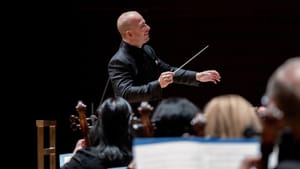Stay in the Loop
BSR publishes on a weekly schedule, with an email newsletter every Wednesday and Thursday morning. There’s no paywall, and subscribing is always free.
Humanity’s spiritual journey
The Philadelphia Orchestra presents Brahms’s German Requiem

The Philadelphia Orchestra hit the trifecta last weekend with a savory program of music inspired by humanity’s spiritual journey as Yannick Nézet-Séguin led a world premiere by Mason Bates, Luis Ernesto Peña Laguna’s Oraison for chorus and orchestra, and Brahms’s massive A German Requiem.
If anything, this program of works embracing contemporary and classical values was almost too much good music to absorb and appreciate, and that is not a complaint. The concert opened with Bates’s colorful Nomad Concerto for violin and orchestra, starring violinist Gil Shaham (for whom the piece was written) and an abundance of exotic percussion instruments. (Rutes and Thai gong, anyone?) Laguna’s multilingual work headed the second part of the program. For the Brahms finish, the stage and conductor’s circle teemed with 174 musicians and choristers as the Philadelphia Symphonic Choir, in its usual superb form (directed by Joe Miller), took the stage alongside the orchestra, featuring soprano Jeanine De Bique and baritone Christopher Maltman, each guest soloist tucked neatly in a high corner of the conductor’s circle overlooking the stage.
Nomadic movements
The Nomad Concerto by itself is an absorbing, moving, and sometimes convivial delight, with Shaham navigating the technical difficulties of the score like an Olympic skier racking up gold medals. Ornamenting the work with spiccato (bouncing), pizzicato (plucking), and techniques I never dreamed possible, such as playing legato and pizzicato at the same time, Bates takes the listener through four encounters (literally “movements”) in the nomad’s life. These are the Song of the Balloon Man, Magician at the Bazaar, Desert Vision: Oasis, and Le Jazz Manouche. Whether you listen to this as an integrated, 25-minute concerto or focus on a particular section (I loved the soulful third movement, based on a Jewish song of sorrow and hope), the work is a breath of fresh air. It elevates and entertains, reminiscent in many places of Berlioz’s viola masterpiece, Harold in Italy.
Oraison and Requiem
The second part of the program, which opened with Laguna’s Oraison for chorus and orchestra, felt like a separate concert for its breadth and scope. The Canadian composer was born in Cuba and brings a universal perspective to this piece, designed as a companion to the Brahms Requiem. But this is no program filler. Dedicated to the memory of Covid-19 victims and caretakers, it is a sweet, soaring essay on humanity’s need for kindness and compassion, ensconced in melodic lines and harmonies of the deepest feeling.
A German Requiem contains several tender melodies that are universally well known (“All flesh is as grass” and “How lovely is thy dwelling place” among them), yet much of this profound musical landscape is terra incognita to many lovers of classical music. Not to Nézet-Séguin, though. He has conducted the Requiem several times with this and other orchestras, but it could not be better than at the Friday, January 26, matinee.
This is a work often played in a subdued manner, but Nézet-Séguin opened the floodgates of the heart. Brahms can be a cerebral composer and was known to rewrite and edit his works many times, which can result in a patina of tradition and classicism not appealing to all listeners. Here, Nézet-Séguin, the Philadelphia Orchestra, and Philadelphia Symphonic Choir maintained the stalwart underpinnings of classical tradition while releasing the emotional energy pent up in the human experience of grief and the yearning for transformation. What a staggering revelation! I wished I could return home Friday evening and play back the timpani crescendos leading to the choral affirmations in the second movement over and over again. Waves of sensation, heartbreak, and hope washed over the conductor’s face, his entire body charged in response to a moody scriptural text selected and compiled by Brahms himself.
De Bique brought an enveloping soprano voice to the fifth movement aria, “You now have sadness.” Her voice modulated with a restraint that made the words deeply personal, like a whisper. From my vantage point, it appeared she was singing without a printed score, which may have contributed to the warmth of her delivery. After a tentative start in the third movement, Maltman’s baritone voice grew strong and expressive in the aria “Lord teach me.” Such a happy coalescence of artists and art.
Champions of humanity
At the beginning of this complex program, Nézet-Séguin offered some explanatory comments that set a tone of informed expectation. What he delineated was the inclusivity of the program. Here, nomads wander like immigrants in a foreign land, and a composer with connections in at least three countries finds expression in four languages, plus the language of music (Oraison). Even Brahms, part of the classical canon, emerges as a champion of humanity, not of a particular church, country, or ethnicity. This human requiem does not require belief in a particular dogma unless, the conductor said, it is the realm of spirituality.
“We all agree,” he added, “that we believe in spirituality. Otherwise, we would not believe in music.”
What, When, Where
Brahms’s German Requiem. Mason Bates, Nomad Concerto; Luis Ernesto Peña Laguna, Oraison; Johannes Brahms, A German Requiem. Conducted by Yannick Nézet-Séguin. Gil Shaham, violin; Jeanine De Bique, soprano; Christopher Maltman, baritone. The Philadelphia Orchestra and the Philadelphia Symphonic Choir. January 26-28, 2024, at the Kimmel Cultural Campus's Verizon Hall, 300 S Broad Street, Philadelphia. (215) 893-1999 or philorch.org.
Accessibility
The Kimmel Cultural Campus is an ADA-compliant venue. Patrons can purchase wheelchair seating or loose chairs online by calling patron services at (215) 893-1999 or by emailing [email protected]. With advance notice, patron services can provide options for personal care attendants, American Sign Language, Braille tickets and programs, audio descriptions, and other services.
Masks are not required in Kimmel venues.
Sign up for our newsletter
All of the week's new articles, all in one place. Sign up for the free weekly BSR newsletters, and don't miss a conversation.

 Linda Holt
Linda Holt